2015秋鲁教版英语37八上Unit 7《Have you ever been to a museum》ppt复习课件
八年级英语上册Unit7Haveyoueverbeentoamuseum?SectionA3a-3c精品教案鲁教版五四制

4. India has the most advanced toilet. ( ) 5. Linlin didn’t know why her grandpa loved drinking and collecting
encourage, social, peaceful, performance, perfect, itself, collect 2. Target language: 1) I wonder how much more computer will be able to do in the future 教 学 目 标 2) Watching them prepare the tea with the beautiful tea sets is just as enjoyable as drinking the tea itself 3. To train students’ reading ability 4. To get students know some knowledge about many kinds of museums. II. Method Objects in Teaching 1) Skimming for details. 2) Reading for comprehension. 3) Communicative approach. III. Sensibility and Value To raise students’ interest of learning English. I. Teaching Key Points 1. Key vocabulary: unbelievable, progress, rapid, unusual, toilet, encourage, social, peaceful, performance, perfect, itself, collect 2. Target language: 教 材 分 析 1) I wonder how much more computer will be able to do in the future 2)Watching them prepare the tea with the beautiful tea sets is just as enjoyable as drinking the tea itself II. Teaching Difficulties 1) How to improve reading skill. 2) To understand the passage and the culture. III. Teaching Aids 1. A computer for multimedia use.
鲁教版英语八年级上Unit7 Have you ever been to a museum SectionA
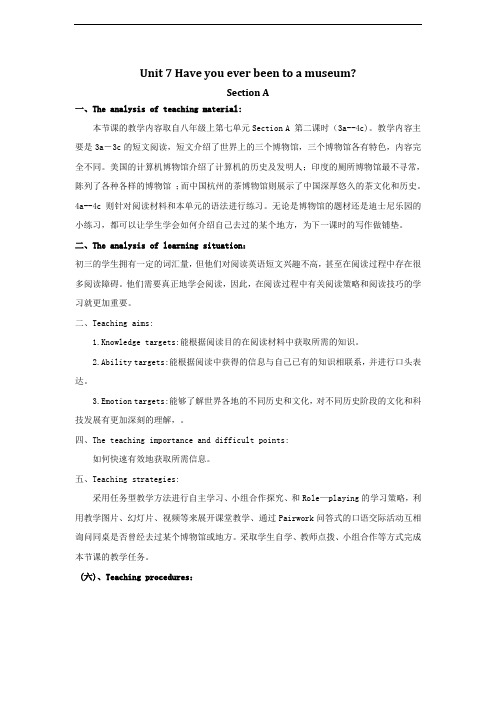
Unit 7Have you ever been to a museum?Section A一、The analysis of teaching material:本节课的教学内容取自八年级上第七单元Section A 第二课时(3a--4c)。
教学内容主要是3a-3c的短文阅读,短文介绍了世界上的三个博物馆,三个博物馆各有特色,内容完全不同。
美国的计算机博物馆介绍了计算机的历史及发明人;印度的厕所博物馆最不寻常,陈列了各种各样的博物馆;而中国杭州的茶博物馆则展示了中国深厚悠久的茶文化和历史。
4a--4c则针对阅读材料和本单元的语法进行练习。
无论是博物馆的题材还是迪士尼乐园的小练习,都可以让学生学会如何介绍自己去过的某个地方,为下一课时的写作做铺垫。
二、The analysis of learning situation:初三的学生拥有一定的词汇量,但他们对阅读英语短文兴趣不高,甚至在阅读过程中存在很多阅读障碍。
他们需要真正地学会阅读,因此,在阅读过程中有关阅读策略和阅读技巧的学习就更加重要。
二、Teaching aims:1.Knowledge targets:能根据阅读目的在阅读材料中获取所需的知识。
2.Ability targets:能根据阅读中获得的信息与自己已有的知识相联系,并进行口头表达。
3.Emotion targets:能够了解世界各地的不同历史和文化,对不同历史阶段的文化和科技发展有更加深刻的理解,。
四、The teaching importance and difficult points:如何快速有效地获取所需信息。
五、Teaching strategies:采用任务型教学方法进行自主学习、小组合作探究、和Role—playing的学习策略,利用教学图片、幻灯片、视频等来展开课堂教学、通过Pairwork问答式的口语交际活动互相询问同桌是否曾经去过某个博物馆或地方。
采取学生自学、教师点拨、小组合作等方式完成本节课的教学任务。
鲁教版英语八年级上Unit7 Have you ever been to a museum SectionA (5)
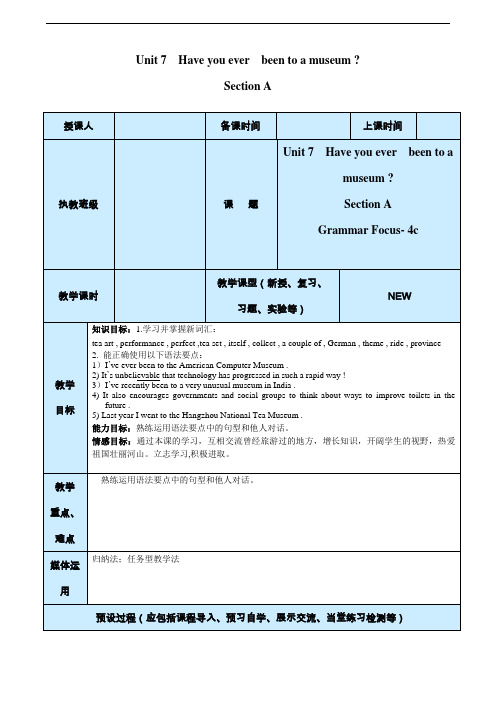
Unit 7 Have you ever been to a museum ?Section A授课人备课时间上课时间执教班级课题Unit 7 Have you ever been to amuseum ?Section AGrammar Focus- 4c教学课时教学课型(新授、复习、习题、实验等)NEW教学目标知识目标:1.学习并掌握新词汇:tea art , performance , perfect ,tea set , itself , collect , a couple of , German , theme , ride , province 2. 能正确使用以下语法要点:1)I’ve ever been to the American Computer Museum .2) It’s unbelievable that technology has progressed in such a rapid way !3)I’ve recently been to a very unusual museum in India .4) It also encourages governments and social groups to think about ways to improve toilets in thefuture .5) Last year I went to the Hangzhou National Tea Museum .能力目标:熟练运用语法要点中的句型和他人对话。
情感目标:通过本课的学习,互相交流曾经旅游过的地方,增长知识,开阔学生的视野,热爱祖国壮丽河山。
立志学习,积极进取。
教学重点、难点熟练运用语法要点中的句型和他人对话。
媒体运用归纳法;任务型教学法预设过程(应包括课程导入、预习自学、展示交流、当堂练习检测等)I. Preparation准备让学生观察Grammar Focus 表格中的例句。
鲁教版英语八上Unit 7 Have you ever been to a museum Secti
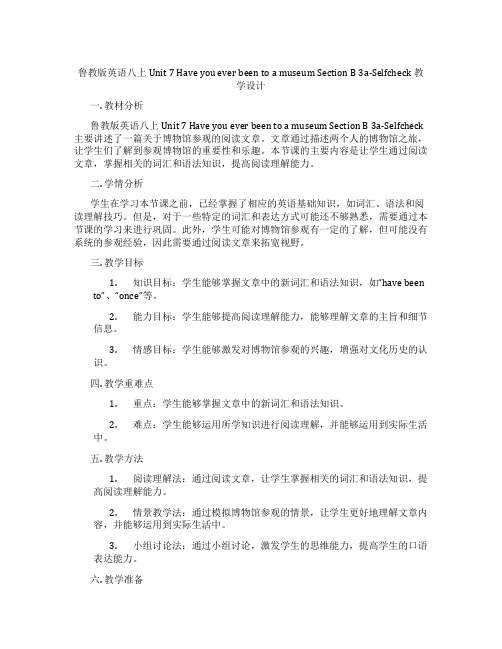
鲁教版英语八上Unit 7 Have you ever been to a museum Section B 3a-Selfcheck 教学设计一. 教材分析鲁教版英语八上Unit 7 Have you ever been to a museum Section B 3a-Selfcheck 主要讲述了一篇关于博物馆参观的阅读文章。
文章通过描述两个人的博物馆之旅,让学生们了解到参观博物馆的重要性和乐趣。
本节课的主要内容是让学生通过阅读文章,掌握相关的词汇和语法知识,提高阅读理解能力。
二. 学情分析学生在学习本节课之前,已经掌握了相应的英语基础知识,如词汇、语法和阅读理解技巧。
但是,对于一些特定的词汇和表达方式可能还不够熟悉,需要通过本节课的学习来进行巩固。
此外,学生可能对博物馆参观有一定的了解,但可能没有系统的参观经验,因此需要通过阅读文章来拓宽视野。
三. 教学目标1.知识目标:学生能够掌握文章中的新词汇和语法知识,如“have beento”、“once”等。
2.能力目标:学生能够提高阅读理解能力,能够理解文章的主旨和细节信息。
3.情感目标:学生能够激发对博物馆参观的兴趣,增强对文化历史的认识。
四. 教学重难点1.重点:学生能够掌握文章中的新词汇和语法知识。
2.难点:学生能够运用所学知识进行阅读理解,并能够运用到实际生活中。
五. 教学方法1.阅读理解法:通过阅读文章,让学生掌握相关的词汇和语法知识,提高阅读理解能力。
2.情景教学法:通过模拟博物馆参观的情景,让学生更好地理解文章内容,并能够运用到实际生活中。
3.小组讨论法:通过小组讨论,激发学生的思维能力,提高学生的口语表达能力。
六. 教学准备1.教师准备:准备好相关的教学材料,如文章、词汇表、语法讲解等。
2.学生准备:学生需要预习文章,了解文章的大致内容。
七. 教学过程1.导入(5分钟)教师可以通过提问方式引导学生谈论博物馆参观的经历,激发学生的兴趣。
2015秋鲁教版英语八上Unit 7《Have you ever been to a museum》(SectionB 3a-Selfcheck)word教案
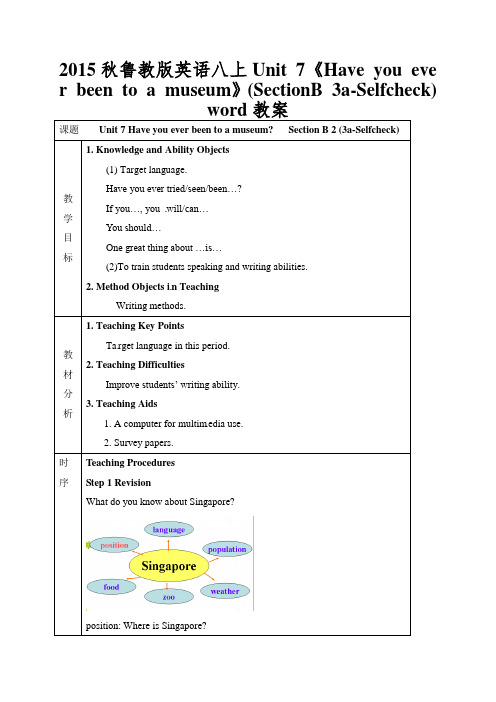
2015秋鲁教版英语八上Unit 7《Have you eve r been to a museum》(SectionB 3a-Selfcheck)word教案课题Unit 7 Have you ever been to a museum? Section B 2 (3a-Selfcheck)教学目标1. Knowledge and Ability Objects(1) Target language.Have you ever tried/seen/been…?If you…, you will/can…You should…One great thing about …is…(2)To train students speaking and writing abilities.2. Method Objects i n TeachingWriting methods.教材分析1. Teaching Key PointsTa rget language in this period.2. Teaching DifficultiesImprove students’ writing ability.3. Teaching Aids1. A computer for multimedia use.2. Survey papers.时序Teaching ProceduresStep 1 RevisionWhat do you know about Singapore?position: Where is Singapore?position: in Southeast AsiaPopulationMore than three quarters of the population are Chinese.LanguageChinese and English.FoodA lot of food from China, such as rice, noodles and dumplings.Indian food, western food and Japanese food.ZooSingapore has a special zoo called the “Night Safari”. A lot of animal only wake up at night, so this is the best time to watch themWeatherThe temperature is almost the same all year round.Step 2 Writing3b Write an article to advertise your hometown or a place you have been to. 句型:Have you ever tri ed/seen/been…?If you…, you will/can…You should…One great thing about …is…Step 3 Self check1. Think about the things below and write an answer for each one.1) One thing that you have collected before:_________________________________2) One invention that you have found to be very useful:_________________________________3) One unbelievable or unusual thing that y ou’ve seen or heard recently:_________________________________4) One way that you’ve used to encourage a friend in the past:_________________________________5) One peaceful and quiet place that you’ve been to recently:________________________________2. Complete the conversation.Get students to complete the conversation. This activity provides writing practice in understanding and writing the target language.A: Hey, John. ______ are you doing this weekend?B: Not much, Mark. I don’t really have any plans yet.A: ______ you ever been to the space museum?B: ______, I have. I ______ there last month.A: Oh, how ______ it?B: It was great. I ______ been there many times.A: I see. I _____ never _______ there.B: Well, let’s go this weekend then. I don’t ______ going again. I think there’s something new there. I _____ not see it last time.A: Perfect!Get students to role play the conversatio n. This activity gives students practice in using the target language.3. Complete the chart.Have you ever been to a/an…How many times? What did you see/dothere?home for old p eople?farm?amusementpark?Step 4 HomeworkWriting写作要求:写一篇80字的文章描述你的家乡或者你去过的地点句型:Have you ever tried/seen/been…? If you…, you will/can…You should…One great thing about …is…。
鲁教版英语八年级上Unit7 Have you ever been to a museum SectionA (1)
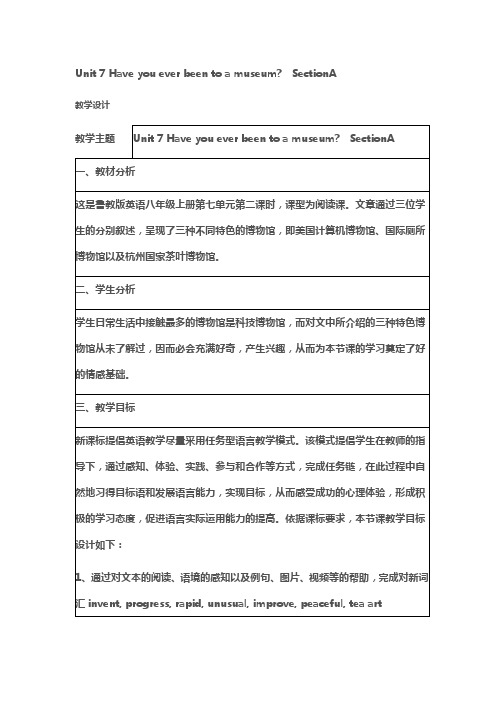
Unit 7 Have you ever been to a museum?SectionA 教学设计
录
(三)读中活动
——仔细阅读puter Museum
知识的拓展与导入:将电脑
图片按照发展史的顺序排
列起来
Task:
Read paragraph1
carefully and choose the
correct word.
2. ToiletMuseum
知识的拓展与导入:直观呈
现厕所博物馆的图片,让学
生惊讶马桶也可以这么有
艺术气息,进而对本部分的
细读产生了浓厚的兴趣
Task:
Read paragraph2
carefully and answer the
questions.
1. 小组讨论之
后,被随机抽
取的小组完成
电脑发展史的
排序任务,获
得加分奖励;
然后细读第一
自然段并完成
相应的学习任
务,展示答案
的学生获得加
分奖励
2.根据图片获
得相关信息后
细读第二自然
段并完成相关
的学习任务,
展示答案的学
生获得加分奖
励
1.利用纸条的功
能,循环播放温馨
提示,培养学生阅
读中做标记的习惯
2.利用电子白板
的拖动功能,让学
生对电脑的发展史
进行了排序
3.利用了备课工
具中的“数字01”,
随机选择小组完成
排序任务
4.利用书写功
能,学生到白板前
呈现第一自然段细
读任务的答案
5.利用隐与现的功
能呈现厕所博物馆
的图片;利用隐藏
功能呈现第二自然。
鲁教版英语八年级上Unit7 Have you ever been to a museum

Unit 7 Have you ever been to a museum ?授课人备课时间上课时间执教班级课题Unit 7 Have you ever beento a museum ?教学课时教学课型(新授、复习、习题、实验等)NEW教学目标知识目标:1. 学习并掌握下列单词:thousand , thousands of, on the one hand ... on the other hand , safe , simply , fear , whether , Indian , Japanese , fox , all year round , equator , whenever , spring , mostly , location ,2. 能正确使用以下常用表达:thousands of , on the one hand ... on the other hand ,3. 学会使用以下句型:1)Have you ever been to Singapore?2)This is the best time to watch them.3)One great thing about Singapore is that the temperature is almost the same all year round.4)This is because the island is so close to the equator.能力目标:通过阅读训练,培养学生的良好的阅读理解能力,同时使学生在理解的基础上对文章进行进一步的解读,以实现对学生进行有利的情感教育的目的。
情感目标:通过本课的学习,培养学生面对困难,想方设法积极应对的精神。
教学重点、难点重点词汇、常用表达及句型。
对学生进行阅读技能的培养媒体运用情景教学法;任务型教学法预设过程(应包括课程导入、预习自学、展示交流、当堂练习检测等)I. Preparation准备1. Free talk “自由交际”Ask and answer in pairs:1)A:Have you been to the Great Wall ?B:Yes , I have / No, I haven’t .2)A: Have you been to the Bird’s Nest ?.B:Yes , I have / No, I haven’t .3)A: Have you seen Terracotta Army ?B:Yes , I have / No, I haven’t .4) A:Have you tried Chinese food ?B:Yes , I have / No, I haven’t .5)A: Have you visited the Palace Museum ?B:Yes , I have / No, I haven’t .2) Role play the conversation.(1d)2. Revision “复习检查”通过检查上节课布置的作业落实作业完成情况,进而为新课的导入铺路搭桥。
鲁教版英语八年级上Unit7 Have you ever been to a museum

Unit7 Have you ever been to a museum?教材分析本单元的话题是“fun places”,在此语境下继续学习现在完成时.Section A学生在听说的基础上掌握常见的主题公园和博物馆的英文名称,学会使用重点句型Have you ever been to ? 及其答语。
对话以及阅读部分逐渐将话题内容从游览过的地方扩展到对某个地方更为具体的描述。
Section B的话题拓展到旅游景点,并通过更加丰富的听力和阅读材料呈现been ever never的用法。
本节课则是通过写作达到笔头落实的目的。
本课时的重难点是运用本单元所学的描写介绍一个地方的多个角度以及相关的句式结构,来介绍自己的家乡威海,实现笔头输出。
本课时的课程内容仅包括3a、3b两部分,提供的课程资源不充分,如果按部就班的按照这两项进行课堂教学,即先完成一个表格然后写一篇文章,则不能够引导学生运用已有的语言知识和语言技能来实现本节课的教学目标。
在把握教学重难点的基础上,根据学生的语言能力和基础对教材内容进行创造性的整合和灵活的取舍。
由于2d介绍新加坡的内容和本课时衔接较为紧密,因此在本课时的写前环节中就将2d内容设计成听力练习的形式再次利用,既起到一个复习的作用又起到一个承上启下的作用。
同时因为口头输出是笔头输出的前提,因此本课时设计了一些讨论的话题,将口语和写作整合到一起。
课程教学资源的延伸和拓展。
要实现本节课的教学目标,仅仅依靠教科书是远远不够的。
因此在写前环节拓展了一个听力资源,并且针对听力内容设计了一个阅读回答问题的内容,一个视频资源以及多个任务活动。
这些新开发的教学资源丰富了教材内容,激发了学生的兴趣,为实现本课时的教学目标起到了不可替代的作用.本部分的内容的教学为一课时的写作课。
鲁教版英语八上Unit 7 Have you ever been to a museum Secti
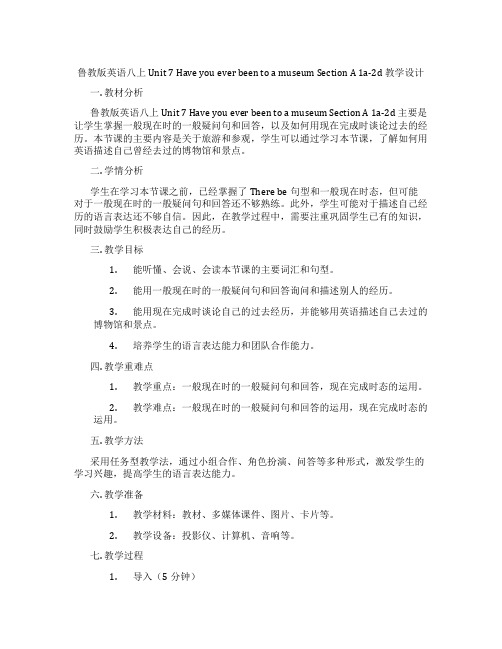
鲁教版英语八上Unit 7 Have you ever been to a museum Section A 1a-2d 教学设计一. 教材分析鲁教版英语八上Unit 7 Have you ever been to a museum Section A 1a-2d 主要是让学生掌握一般现在时的一般疑问句和回答,以及如何用现在完成时谈论过去的经历。
本节课的主要内容是关于旅游和参观,学生可以通过学习本节课,了解如何用英语描述自己曾经去过的博物馆和景点。
二. 学情分析学生在学习本节课之前,已经掌握了There be句型和一般现在时态,但可能对于一般现在时的一般疑问句和回答还不够熟练。
此外,学生可能对于描述自己经历的语言表达还不够自信。
因此,在教学过程中,需要注重巩固学生已有的知识,同时鼓励学生积极表达自己的经历。
三. 教学目标1.能听懂、会说、会读本节课的主要词汇和句型。
2.能用一般现在时的一般疑问句和回答询问和描述别人的经历。
3.能用现在完成时谈论自己的过去经历,并能够用英语描述自己去过的博物馆和景点。
4.培养学生的语言表达能力和团队合作能力。
四. 教学重难点1.教学重点:一般现在时的一般疑问句和回答,现在完成时态的运用。
2.教学难点:一般现在时的一般疑问句和回答的运用,现在完成时态的运用。
五. 教学方法采用任务型教学法,通过小组合作、角色扮演、问答等多种形式,激发学生的学习兴趣,提高学生的语言表达能力。
六. 教学准备1.教学材料:教材、多媒体课件、图片、卡片等。
2.教学设备:投影仪、计算机、音响等。
七. 教学过程1.导入(5分钟)通过向学生展示一些博物馆和景点的图片,引导学生谈论自己去过的博物馆和景点,激发学生的学习兴趣。
2.呈现(10分钟)教师通过课件呈现本节课的主要词汇和句型,让学生跟读并模仿。
3.操练(15分钟)学生分成小组,用英语描述自己去过的博物馆和景点,其他小组成员倾听并做出回应。
4.巩固(10分钟)教师设计一些练习题,让学生练习一般现在时的一般疑问句和回答,以及现在完成时态的运用。
鲁教版英语八上Unit 7 Have you ever been to a museum Secti
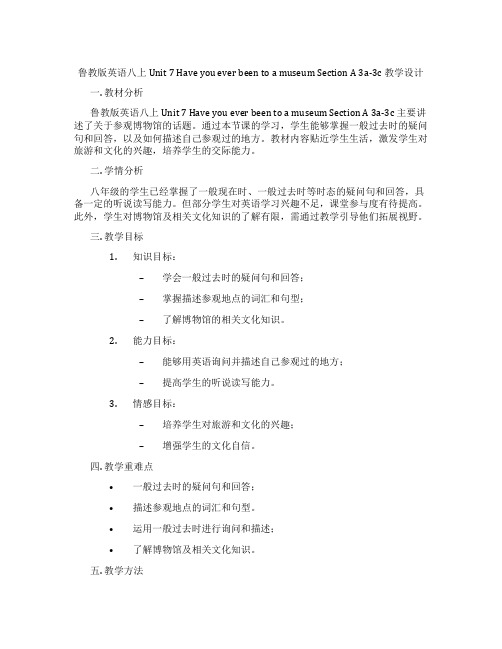
鲁教版英语八上Unit 7 Have you ever been to a museum Section A 3a-3c 教学设计一. 教材分析鲁教版英语八上Unit 7 Have you ever been to a museum Section A 3a-3c 主要讲述了关于参观博物馆的话题。
通过本节课的学习,学生能够掌握一般过去时的疑问句和回答,以及如何描述自己参观过的地方。
教材内容贴近学生生活,激发学生对旅游和文化的兴趣,培养学生的交际能力。
二. 学情分析八年级的学生已经掌握了一般现在时、一般过去时等时态的疑问句和回答,具备一定的听说读写能力。
但部分学生对英语学习兴趣不足,课堂参与度有待提高。
此外,学生对博物馆及相关文化知识的了解有限,需通过教学引导他们拓展视野。
三. 教学目标1.知识目标:–学会一般过去时的疑问句和回答;–掌握描述参观地点的词汇和句型;–了解博物馆的相关文化知识。
2.能力目标:–能够用英语询问并描述自己参观过的地方;–提高学生的听说读写能力。
3.情感目标:–培养学生对旅游和文化的兴趣;–增强学生的文化自信。
四. 教学重难点•一般过去时的疑问句和回答;•描述参观地点的词汇和句型。
•运用一般过去时进行询问和描述;•了解博物馆及相关文化知识。
五. 教学方法1.任务型教学法:通过完成具体任务,激发学生学习兴趣,提高学生的参与度;2.情境教学法:创设真实情境,让学生在实践中学会运用英语描述参观经历;3.交际法:引导学生进行小组讨论,培养学生的交际能力;4.文化导入法:介绍博物馆及相关文化知识,拓宽学生视野。
六. 教学准备1.教学课件:制作包含图片、视频等多媒体资源的课件,便于引导学生直观地了解博物馆;2.教学素材:准备相关旅游和文化资料,丰富教学内容;3.教学用具:黑板、粉笔等;4.课堂活动准备:分组讨论、角色扮演等。
七. 教学过程1.导入(5分钟)–教师通过展示博物馆的图片,引导学生谈论自己参观过的地方,为新课的学习营造轻松的氛围;–利用提问方式激活学生已有知识,导入一般过去时。
2015秋鲁教版英语八上Unit 7《Have you ever been to a museum》单元检测题
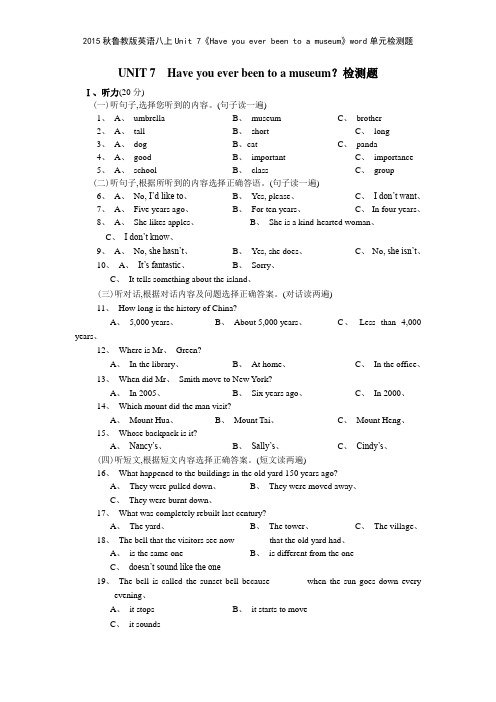
UNIT 7 Have you ever been to a museum?检测题Ⅰ、听力(20分)(一)听句子,选择您听到的内容。
(句子读一遍)1、A、umbrella B、museum C、brother2、A、tall B、short C、long3、A、dog B、cat C、panda4、A、good B、important C、importance5、A、school B、class C、group(二)听句子,根据所听到的内容选择正确答语。
(句子读一遍)6、A、No, I’d like to、B、Yes, please、C、I don’t want、7、A、Five years ago、B、For ten years、C、In four years、8、A、She likes apples、B、She is a kind-hearted woman、C、I don’t know、9、A、No, she hasn’t、B、Yes, she does、C、No, she isn’t、10、A、It’s fantastic、B、Sorry、C、It tells something about the island、(三)听对话,根据对话内容及问题选择正确答案。
(对话读两遍)11、How long is the history of China?A、5,000 years、B、About 5,000 years、C、Less than 4,000 years、12、Where is Mr、Green?A、In the library、B、At home、C、In the office、13、When did Mr、Smith move to New York?A、In 2005、B、Six years ago、C、In 2000、14、Which mount did the man visit?A、Mount Hua、B、Mount Tai、C、Mount Heng、15、Whose backpack is it?A、Nancy’s、B、Sally’s、C、Cindy’s、(四)听短文,根据短文内容选择正确答案。
鲁教版英语八上Unit 7 Have you ever been to a museum Secti
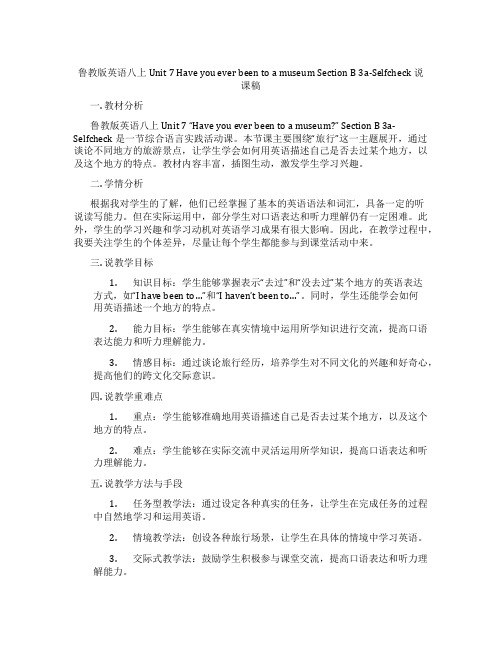
鲁教版英语八上Unit 7 Have you ever been to a museum Section B 3a-Selfcheck 说课稿一. 教材分析鲁教版英语八上Unit 7 “Have you ever been to a museum?” Section B 3a-Selfcheck 是一节综合语言实践活动课。
本节课主要围绕“旅行”这一主题展开,通过谈论不同地方的旅游景点,让学生学会如何用英语描述自己是否去过某个地方,以及这个地方的特点。
教材内容丰富,插图生动,激发学生学习兴趣。
二. 学情分析根据我对学生的了解,他们已经掌握了基本的英语语法和词汇,具备一定的听说读写能力。
但在实际运用中,部分学生对口语表达和听力理解仍有一定困难。
此外,学生的学习兴趣和学习动机对英语学习成果有很大影响。
因此,在教学过程中,我要关注学生的个体差异,尽量让每个学生都能参与到课堂活动中来。
三. 说教学目标1.知识目标:学生能够掌握表示“去过”和“没去过”某个地方的英语表达方式,如“I have been to…”和“I haven’t been to…”。
同时,学生还能学会如何用英语描述一个地方的特点。
2.能力目标:学生能够在真实情境中运用所学知识进行交流,提高口语表达能力和听力理解能力。
3.情感目标:通过谈论旅行经历,培养学生对不同文化的兴趣和好奇心,提高他们的跨文化交际意识。
四. 说教学重难点1.重点:学生能够准确地用英语描述自己是否去过某个地方,以及这个地方的特点。
2.难点:学生能够在实际交流中灵活运用所学知识,提高口语表达和听力理解能力。
五. 说教学方法与手段1.任务型教学法:通过设定各种真实的任务,让学生在完成任务的过程中自然地学习和运用英语。
2.情境教学法:创设各种旅行场景,让学生在具体的情境中学习英语。
3.交际式教学法:鼓励学生积极参与课堂交流,提高口语表达和听力理解能力。
4.利用多媒体教学手段:通过播放旅行相关的视频、音频和图片,丰富教学内容,激发学生学习兴趣。
鲁教版英语八上Unit 7 Have you ever been to a museum Secti
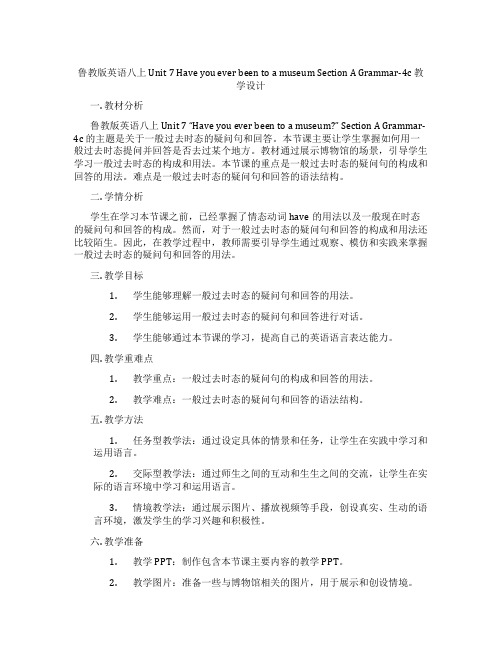
鲁教版英语八上Unit 7 Have you ever been to a museum Section A Grammar-4c 教学设计一. 教材分析鲁教版英语八上Unit 7 “Have you ever been to a museum?” Section A Grammar-4c 的主题是关于一般过去时态的疑问句和回答。
本节课主要让学生掌握如何用一般过去时态提问并回答是否去过某个地方。
教材通过展示博物馆的场景,引导学生学习一般过去时态的构成和用法。
本节课的重点是一般过去时态的疑问句的构成和回答的用法。
难点是一般过去时态的疑问句和回答的语法结构。
二. 学情分析学生在学习本节课之前,已经掌握了情态动词have的用法以及一般现在时态的疑问句和回答的构成。
然而,对于一般过去时态的疑问句和回答的构成和用法还比较陌生。
因此,在教学过程中,教师需要引导学生通过观察、模仿和实践来掌握一般过去时态的疑问句和回答的用法。
三. 教学目标1.学生能够理解一般过去时态的疑问句和回答的用法。
2.学生能够运用一般过去时态的疑问句和回答进行对话。
3.学生能够通过本节课的学习,提高自己的英语语言表达能力。
四. 教学重难点1.教学重点:一般过去时态的疑问句的构成和回答的用法。
2.教学难点:一般过去时态的疑问句和回答的语法结构。
五. 教学方法1.任务型教学法:通过设定具体的情景和任务,让学生在实践中学习和运用语言。
2.交际型教学法:通过师生之间的互动和生生之间的交流,让学生在实际的语言环境中学习和运用语言。
3.情境教学法:通过展示图片、播放视频等手段,创设真实、生动的语言环境,激发学生的学习兴趣和积极性。
六. 教学准备1.教学PPT:制作包含本节课主要内容的教学PPT。
2.教学图片:准备一些与博物馆相关的图片,用于展示和创设情境。
3.教学视频:准备一段与博物馆相关的视频,用于展示和创设情境。
4.练习题:准备一些练习题,用于巩固所学知识。
鲁教版英语八年级上Unit7 Have you ever been to a museum (1)
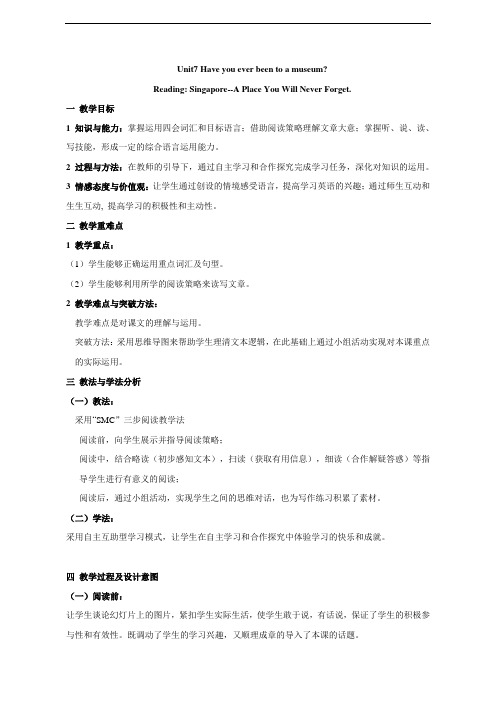
Unit7 Have you ever been to a museum?Reading: Singapore--A Place You Will Never Forget.一教学目标1 知识与能力:掌握运用四会词汇和目标语言;借助阅读策略理解文章大意;掌握听、说、读、写技能,形成一定的综合语言运用能力。
2 过程与方法:在教师的引导下,通过自主学习和合作探究完成学习任务,深化对知识的运用。
3 情感态度与价值观:让学生通过创设的情境感受语言,提高学习英语的兴趣;通过师生互动和生生互动, 提高学习的积极性和主动性。
二教学重难点1 教学重点:(1)学生能够正确运用重点词汇及句型。
(2)学生能够利用所学的阅读策略来读写文章。
2 教学难点与突破方法:教学难点是对课文的理解与运用。
突破方法:采用思维导图来帮助学生理清文本逻辑,在此基础上通过小组活动实现对本课重点的实际运用。
三教法与学法分析(一)教法:采用“SMC”三步阅读教学法阅读前,向学生展示并指导阅读策略;阅读中,结合略读(初步感知文本),扫读(获取有用信息),细读(合作解疑答惑)等指导学生进行有意义的阅读;阅读后,通过小组活动,实现学生之间的思维对话,也为写作练习积累了素材。
(二)学法:采用自主互助型学习模式,让学生在自主学习和合作探究中体验学习的快乐和成就。
四教学过程及设计意图(一)阅读前:让学生谈论幻灯片上的图片,紧扣学生实际生活,使学生敢于说,有话说,保证了学生的积极参与性和有效性。
既调动了学生的学习兴趣,又顺理成章的导入了本课的话题。
(二)阅读中1 学习策略指导。
展示阅读策略,讲解如何利用策略来帮助学生读写文章。
2 略读找大意(Skimming)。
让学生初步感知课文,找出每段的段落话题,并按正确顺序排序,培养学生的概括能力。
3 扫读寻细节(Scanning)。
让学生再次熟悉课文,提取关键信息并完成填空。
4 细读完成任务(Careful-reading).任务:(1)在任务的驱动下,师生共同阅读第一段,教师为学生示范如何学习阅读课。
2015秋鲁教版英语八上Unit 7《Have you ever been to a museum》word教案
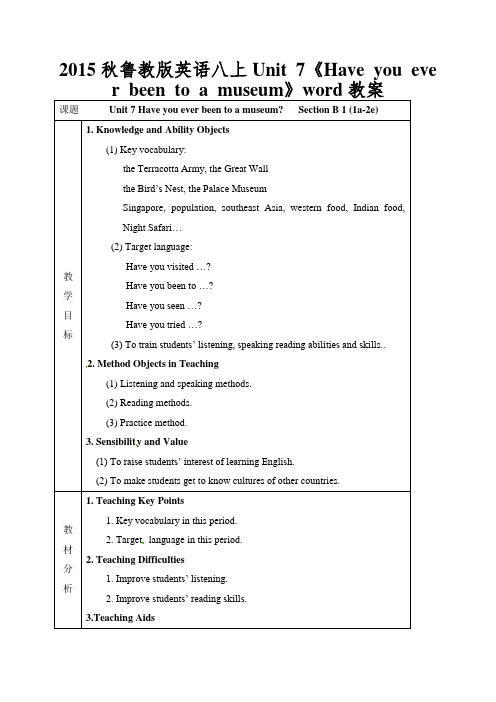
2015秋鲁教版英语八上Unit 7《Have you eve r been to a museum》word教案课题Unit 7 Have you ever been to a museum? Section B 1 (1a-2e)教学目标1. Knowledge and Ability Objects(1) Key vocabulary:the Terracotta Army, the Great Wallthe Bird’s Nest, the Palace Mus eumSingapore, population, southeast Asia, western food, Indian food,Night Safari…(2) Target language:Have you visited …?Have you been to …?Have you seen …?Have you tried …?(3) To train students’ listening, speaking reading abilities and skill s..2. Method Objects in Teaching(1) Listening and speaking methods.(2) Reading methods.(3) Practice method.3. Sensibilit y and Value(1) To raise students’ interest of learning English.(2) To make students get to know cultures of other countries.教材分析1. Teaching Key Points1. Key vocabulary in this period.2. Target language in this period.2. Teaching Difficulties1. Improve students’ listening.2. Improve students’ reading skills.3.Teaching Aids1. A computer for multimedia use.2. A tape recorder.Teaching Procedures时序Step 1 RevisionComplete the sentences.Step 2 Pre-listening1. Look at the pictures and learn the new words.thousand num. 一千thousands of 数以千计的safe adj.安全的fear v.& n.可怕;惧怕Indian adj.印度人;印度的spring n.春天Japanese adj.日本人;日本的fox n.狐狸equator n.赤道2. Look at the pictures and review the sentence pattern: Have you ever been to…?3. Finish exercise 1a on textbook. Match the pictures with names._________ the Terracotta Army_________ the Great Wall_________ the Bird’s Nest_________ the Palace MuseumKeys: c, a, d, bStep 3 Listening1. Listen to a student interviewing a foreign student. Check (√) the question youhear._______ Have you visited the Palace Museum?_______ Have you been to the Great Wall?_______ Have you been to the Bird’s Nest?_______ Have you seen the Terracotta Army?_______ Have you tried Chin ese food?Keys: 1,3, 52. Listen again and take notes.Name: _____________________________________Country: ___________________________________How long in China ________________________Places visited: ____________________________Food: __________________________________Keys: Peter, Australia, two weeks, the Palace Museum, the Great Wall, the Bird’s Nest, the Terr acotta Army, Beijing DuckStep 4 SpeakingWork in pairs to ask your partner where she/he has been to?Have you visited …?Have you been to …?Have you seen …?Have you tried …?Step 5 Reading1. Introduction o f Singapore1)Look at some pictures and watch some videos about Singapore2)Talk about the symbol of Singapore2. Fill in the blanks according to the article.Singapore’s geographical position A small island (1) ____________ Language(s) people speak in(2) ______________________ SingaporeFood we can find in Singapore Chinese food, (3) __________ andJapanese food.Name of the night zoo in Singapore (4) ___________Temperature in Singapore It is (5) ______________ all year round.Keys: 1. in Southeast Asia 2. Putonghua and English 3. Indian food, western food 4.Night Safari 5. almost the same4. Work on 2b. Read the article. How many reasons can you find for visitingSingapore?5. Work on 2c. The statements below are false. Use information from the article tocorrect them.1. Most people in Singapore only speak English.2. It is not easy to get many different kinds of good food in Singapore.3. I t’s better to see lions and tigers during the daytime because they will probablybe awake.4. It’s best to visit Singapore in the autumn.Keys: 1. both English and Chinese2. very easy3. at night4. whenever you like6. Work on 2d. Fill in conversation about Singapore using the information form the article.A: I am going to Singapore next week. _____ you ever ____ there before?B: Yes, I’ve ____ to Singapore many times. It’s my favorite country in ____Asia.A: What languages do people ______ there?B: Mostly Chinese and _______.A: What about the food? Is it g ood?B: It’s excellent! _____ you ever tried Indian food? Indian fo od is really goodin Singapore.A: I see. Have you ____ heard of the Night Safari? Someone told me to gothere.B: Yes! I ____ been to the Night Safari. It was really exciting to ___ the animals in the darkA: And it is always _____ in Singapore?B: All ____ round! It’s always summer there!Keys: Have, been, be en, Southeast, speak, English, have, ever, have, see, warm, yearStep 6 Language points1. on the one hand… on the other hand一方面……另一方面……e.g. On the one hand, she taught English, on the other hand she learnedChinese. 她一方面教英语, 一方面学习汉语.2. …more than three quarters of the population are Chinese…quarter n.四分之一;一刻钟e.g. I've got to go in a quarter of an hour... 一刻钟以后我就得走了。
鲁教版(五四学制)英语八年级上册:Unit 7 Have you ever been to a museum. 教案1
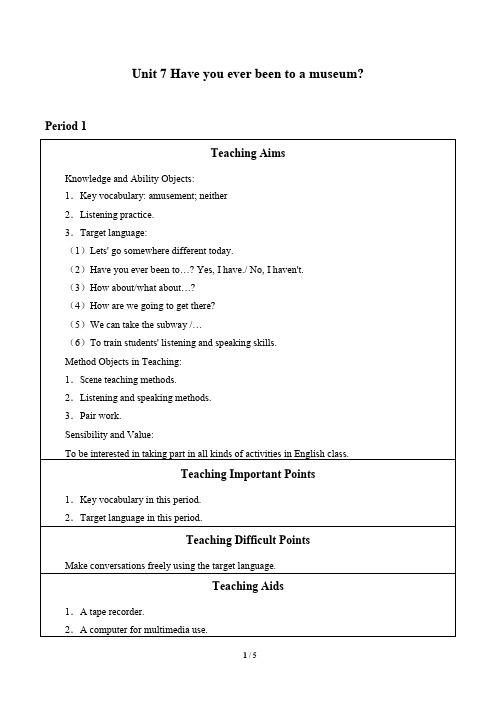
Unit 7 Have you ever been to a museum? Period 1Teaching ProceduresStep 1 Greetings and Revision.Greet the class and check the homework.Step 2 Lead-in.1.Guess the places of the pictures; they are the British Museum, space museum, history museum, water park, zoo, amusement park while leading in sentence patterns:“ Have you ever been to …?”2.Speaking.Get students to work in pairs to practice the conversation: “ Have you ever been to…”“Yes, I have/ Not, I haven't. ”Step 3 Pre-listening.1.Section A 1a.T: In Part 1a, 6 places are given. Please read the names of these places. (Teacher writes the names on the blackboard.) Which of these places would you like to visit? Rank them from 1 to 5.S4: Amusement park ______, water park ______, zoo ______ aquarium ______ space museum ______.S5: Space museum ______, aquarium ______, zoo ______, water park ______, amusement park ______S6: …2.Talk about the picture.Step 4 Listening.1.Listen and choose the best answer. The first and the second question aim to listening to time, and the third one aims to listen for the relationship. This activity trains students' listening ability for listening for specific relationship.(1)When did Sarah visit the National Science Museum?A.Today B.Yesterday C.Last year(2)When did Claudia visit the nature museum?A.last year B.last summer C.Last school trip(3)What may the relationship be between the two speakers?A.Friends B.Teacher and student C.Mother and kidAnswer: CCASpeaking 1:Look at the map in 2a and make conversations about the places.A: Have you ever been to the space museum?B: Yes, I have. How about you?A: No, I haven't.B: Oh, it's fantastic. Let's go tomorrow.A: OK. How are we going to get there?B: We can take the subway.Speaking 2.Role-play the conversation in 2d.A: I went to the film museum last weekend. Have you ever been there?B: Yes, I have. I went there back in April.Step 7 Language points.1.I learned about the inventions that led to color movies, too. 我还了解了一些发明,它们成就了彩色电影。
鲁教版英语八年级上Unit7 Have you ever been to a museum(2)
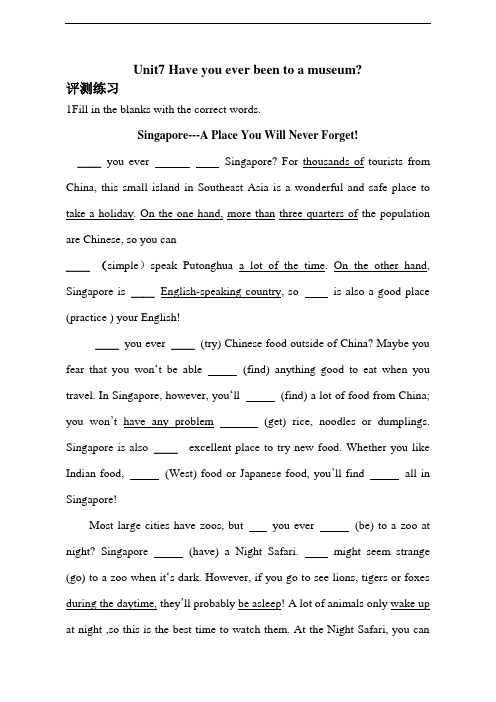
Unit7 Have you ever been to a museum?评测练习1Fill in the blanks with the correct words.Singapore---A Place You Will Never Forget!__you ever Singapore? For thousands of tourists from China, this small island in Southeast Asia is a wonderful and safe place to take a holiday. On the one hand, more than three quarters of the population are Chinese, so you can__(simple)speak Putonghua a lot of the time. On the other hand, Singapore is __English-speaking country, so is also a good place (practice ) your English!__you ever __(try) Chinese food outside of China? Maybe you fear that you won‘t be able (find) anything good to eat when you travel. In Singapore, however, you‘ll (find) a lot of food from China; you won’t have any problem (get) rice, noodles or dumplings. Singapore is also __excellent place to try new food. Whether you like Indian food, (West) food or Japanese food, you’ll find all in Singapore!Most large cities have zoos, but you ever (be) to a zoo at night? Singapore (have) a Night Safari. might seem strange (go) to a zoo when it‘s dark. However, if you go to see lions, tigers or foxes during the daytime, they’ll probably be asleep! A lot of animals only wake up at night ,so this is the best time to watch them. At the Night Safari, you canwatch these animals in a __natural environment than in a normal zoo.One great thing about Singapore is that the temperature is almost the same all year round. This is because the island is so close to the equator. so you can choose __(go) whenever you like---spring, summer, autumn or winter. And, of course, it‘s not too far from China.2 The statements below are false. Use information from the article to correct them.1. Most people in Singapore only speak English.2. It is not easy to get many different kinds of good food in Singapore.3. It is better to see lions and tigers during the daytime because they will probably be awake.4. It is best to visit Singapore in the autumn.3 Fill in the conversation about Singapore using the information from the article.A:I’m going to Singapore next week. ________ you ever _______there before?B:Yes, I’ve________ to Singapore many times. It’s my favorite city in_______ Asia.A:What languages do people___________ there?B:Mostly Chinese and__________.A:What about the food? Is it good?B:It‘s excellent!________ you ever tried Indian food? Indian food is really good in Singapore.A:I see. Have you________ heard of the Night Safari? Someone told me to go there.B:Yes! I_________ been to the Night Safari. It was really exciting to_________ the animals in the dark.A:And is it always________ in Singapore?B:All_____ round! It’s always summer there!4. Complete the conversation.A:Hey, John.__________ are you doing this weekend?B:Not much, Mark. I don‘t really have any plans yet.A:_____________ you ever been to the space museum?B:, I have. I________________ there last month.A:Oh, how______________ it?B:It was great. I_______________ been there many times.A:I see. I________________ never__________________ there.B:Well, let‘s go this weekend then. I don‘t______________ going again. I think there’s something new there. I______________ not see it last time. A:Perfect!。
鲁教版(五四学制)英语八年级上册:Unit 7 Have you ever been to a museum. 教案5

Unit 7 Have you ever been to a museum? Period 5What do you know about Singapore?in Southeast Asia.Population:More than three quarters of the population are Chinese.Language:Chinese and English.Food:A lot of food from China, such as rice, noodles and dumplings.Indian food, western food and Japanese food.Zoo:Singapore has a special zoo called the “Night Safari”. A lot of animal only wake up at night, so this is the best time to watch them.Weather:The temperature is almost the same all year round.Step 2 Writing.3b Write an article to advertise your hometown or a place you have been to.句型:Have you ever tried/seen/been…?If you…, you will/can…You should…One great thing about…is…Step 3 Self check.1.Think about the things below and write an answer for each one.(1)One thing that you have collected before:_________________________________(2)One invention that you have found to be very useful:_________________________________(3)One unbelievable or unusual thing that you've seen or heard recently:_________________________________(4)One way that you've used to encourage a friend in the past:_________________________________(5)One peaceful and quiet place that you've been to recently:。
- 1、下载文档前请自行甄别文档内容的完整性,平台不提供额外的编辑、内容补充、找答案等附加服务。
- 2、"仅部分预览"的文档,不可在线预览部分如存在完整性等问题,可反馈申请退款(可完整预览的文档不适用该条件!)。
- 3、如文档侵犯您的权益,请联系客服反馈,我们会尽快为您处理(人工客服工作时间:9:00-18:30)。
3. 现在完成时经常与already( 已经 )常用于肯定 还没有 曾经 ), never 句, yet( )常用于否定句, ever( (从不), before, for, since连用。 用for, since填空: 1)We haven’t seen each other ____ for a long time. since 10 2) His father has been in the Party _____ years ago. for 20 minutes. 3) The film has been on _____ since he came 4) Mr Green has worked here ______ to China.
Unit7 复习课件
一.复习重点短语: space museum (2)听说 hear of/about (1)太空博物馆 ______________ amusement park 许多乐趣 much fun (3)娱乐公园________________(4) water park (5)水上公园 ____________ (6)乘地铁 take the subway (7)玩得愉快 have a great time(其他) take lessons )去过某地 have been to 8)上课____________9 10)去了某地_______ hБайду номын сангаасve gone to11)乘船 __________ take a boat/by boat see sb. doing… 12)看到某人在做……_____________________ be close to 14)在东南亚_________ in Southeast Asia 13)紧靠 _________ 15)醒来 ______________ 16)度假___________ wake up take a holiday year round go on vacation/go 17) 一年到头all ____________ for a trip 18) 导游___________ tour guide end up with sth./ doing sth. 19) 结束,以……结尾__________________ 20)做某事有困难 have some problems (in)doing …
It is/was +被强调部分+that/who +其他
二.课文重点: 1.现在完成时的结构:(Present Perfect Tense) 主语+ have / has + 动词的过去分词(done) 否定结构:主语+haven’t / hasn’t + 过去分词+… 一般疑问句结构: Have\ Has +主语+ 过去分词+
21.讲英语的国家 an English-speaking country leave school 22.而不是 rather than 23.离校/毕业 24.采用不同的航线 take different routes 25.多于 more than 26.练习做某事 practice doing sth.
过去 2)表示从 __ 某个时间开始并一直持续到 ___ 的动作或状态,句中的动词必须是 现在 ______ 动词。常和表示 ___ 一段 时间状语 延续性 连用。如:these days, for two years, since … eg. 我认识李雷三年了。 have known for years / I ___ ___ Li Lei three ________three years ago. since
2. 用法:
1)表示过去发生或已经完成的动作对 现在 ____ 造成的 影响或结果。 eg. 我已经吃过早餐了。 eaten breakfast. I have _____ already _______ (吃早餐这个动作发生在 过去 ____ , 对现在造成的影响是 我吃饱了,不饿了 ___________ )
27.一些吃的东西 something to eat 28.四分之三 29.睡着的 three quarters be asleep 30.是…还是 31.醒着的 whether… or be awake 32.更自然的 33.例如 more natural such as 34.最重要的要求 the most important requirement 35.在白天 during the daytime 36.考虑着做某事 think about doing sth./sth. 37.强调结构
4. 现在完成时与一般过去时的区别: 现在完成时强调过去发生的事情对现在造成
的影响或结果,强调的是现在的情况,不能和表
示过去的时间连用.如:yesterday, last night,
three days ago, in 1999等.
I have seen this film since three days ago. (T) I have seen this film three days ago. (F)
随堂练
gave (give)up smoking last year. 1) Mr Chen ___________ has already found 2) Jack _______________ (already find) his watch. went 3)She ____________ (go) to the zoo last week. haven’t 4)They ______________ (not have) been to the Great Wall. Has 5)A: _________ (have) she ever been to China? B: went Yes, she ________ (go) there in 1989. 6) My brother ________ bought (buy) a car last month.
